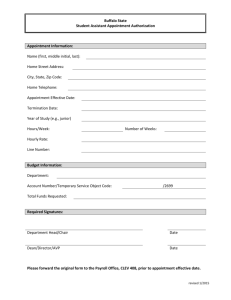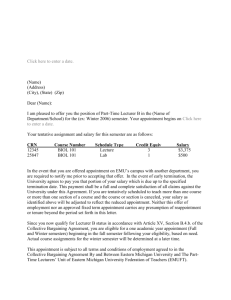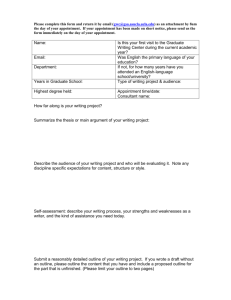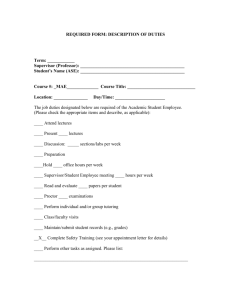Curry Health Center (CHC)
advertisement
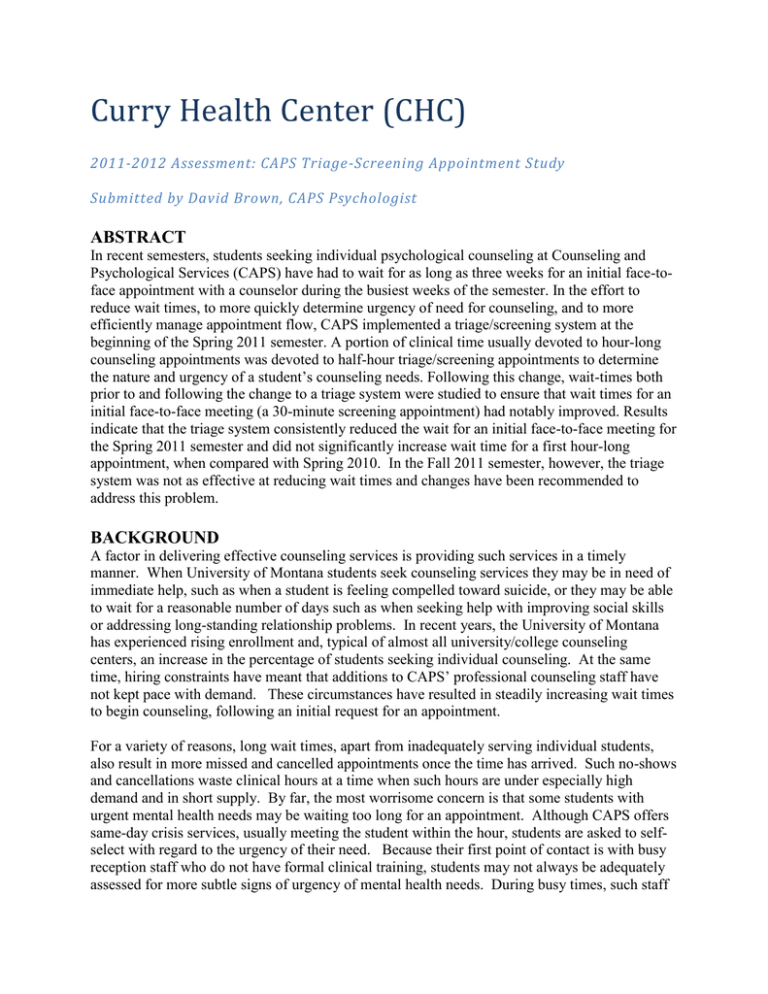
Curry Health Center (CHC) 2011-2012 Assessment: CAPS Triage-Screening Appointment Study Submitted by David Brown, CAPS Psychologist ABSTRACT In recent semesters, students seeking individual psychological counseling at Counseling and Psychological Services (CAPS) have had to wait for as long as three weeks for an initial face-toface appointment with a counselor during the busiest weeks of the semester. In the effort to reduce wait times, to more quickly determine urgency of need for counseling, and to more efficiently manage appointment flow, CAPS implemented a triage/screening system at the beginning of the Spring 2011 semester. A portion of clinical time usually devoted to hour-long counseling appointments was devoted to half-hour triage/screening appointments to determine the nature and urgency of a student’s counseling needs. Following this change, wait-times both prior to and following the change to a triage system were studied to ensure that wait times for an initial face-to-face meeting (a 30-minute screening appointment) had notably improved. Results indicate that the triage system consistently reduced the wait for an initial face-to-face meeting for the Spring 2011 semester and did not significantly increase wait time for a first hour-long appointment, when compared with Spring 2010. In the Fall 2011 semester, however, the triage system was not as effective at reducing wait times and changes have been recommended to address this problem. BACKGROUND A factor in delivering effective counseling services is providing such services in a timely manner. When University of Montana students seek counseling services they may be in need of immediate help, such as when a student is feeling compelled toward suicide, or they may be able to wait for a reasonable number of days such as when seeking help with improving social skills or addressing long-standing relationship problems. In recent years, the University of Montana has experienced rising enrollment and, typical of almost all university/college counseling centers, an increase in the percentage of students seeking individual counseling. At the same time, hiring constraints have meant that additions to CAPS’ professional counseling staff have not kept pace with demand. These circumstances have resulted in steadily increasing wait times to begin counseling, following an initial request for an appointment. For a variety of reasons, long wait times, apart from inadequately serving individual students, also result in more missed and cancelled appointments once the time has arrived. Such no-shows and cancellations waste clinical hours at a time when such hours are under especially high demand and in short supply. By far, the most worrisome concern is that some students with urgent mental health needs may be waiting too long for an appointment. Although CAPS offers same-day crisis services, usually meeting the student within the hour, students are asked to selfselect with regard to the urgency of their need. Because their first point of contact is with busy reception staff who do not have formal clinical training, students may not always be adequately assessed for more subtle signs of urgency of mental health needs. During busy times, such staff are in the awkward, stressful position of trying to determine whether a student can wait for an appointment or should be encouraged to come in for a same-day appointment. Reception staff are trained to err on the side of caution and offer immediate service if a student seems to indicate that their needs are urgent. However, some students whose needs may be quite urgent may not identify themselves as such due to ambivalence about seeking help or not wanting to be viewed as particularly in need or otherwise vulnerable. As numbers of students with suicidal thoughts and impulsivity toward acting on suicidal thoughts have increased nationwide, CAPS professional staff have become increasingly worried about excessive wait times without any formal process in place to assess the urgency of a student’s need. During the Fall 2010 semester it was decided that CAPS would implement a triage system, in Spring 2011, using professional staff to meet with students for a half-hour appointment to determine the nature and urgency of their counseling needs. The initial goal was to “triage” all students calling for a first-time appointment within two to three days of their initial request. Students continued to have the option of coming to counseling immediately if the student or receptionist believed their need was urgent. It was understood that the new system might increase wait times for a full hour-long counseling appointment, but it offered the advantage of better determining which students might be at greater risk of deterioration of their mental health or other life circumstances if not seen quickly. The purpose of this process was threefold: 1) to determine the average length of wait for a faceto-face appointment with a professional counselor at times of modest demand and heavy demand during the Spring 2010 semester (i.e., before a triage system was implemented), 2) to implement a triage system, using briefer initial appointments, with the aim of seeing all students requesting an appointment within 2-3 days of their appointment request, and 3) to verify that these changes improved wait times for a first contact with a clinician during the Spring 2011 semester. Studying wait-times during the same two-week span in consecutive Spring semesters was intended to ensure that wait-time samples were taken during periods of similar appointment demands. PROCEDURE During three separate two-week periods coinciding with predictable periods of higher demand during the Spring 2010 and Spring 2011 semesters, time spans were measured starting with the date of a student’s request for an appointment and ending at the date of the first face-to-face interview by a clinician. Data was collected from CAPS Medicat EMR (electronic medical records) scheduling and service records. Unfortunately, report data generated by Medicat’s integral data reporting program was frequently unreliable and, to ensure accuracy, all of the data reported below was generated by examining individual client records within Medicat. The data was collected and analyzed by a CAPS clinical psychologist with extensive experience in research design and statistical analysis. A total of 50 client records were reviewed for each time span to sample different date ranges within each semester. Time spans were measured from the date the appointment was requested to the first face-to-face meeting between the student and a professional counselor. Records were not used for those students who called to change their appointment dates to a later date. FINDINGS In the Spring 2010 semester the wait times for a face-to-face appointment with a CAPS therapist were as follows: Spring Semester 2010 Weeks 2-3 Weeks 7-8 Weeks 12-13 Weeks 1-16 Avg. Wait from Appointment Request to Intake (Days) 5.1 9.2 17.5 9.9 In the early weeks of the semester, wait times were not excessive, but by weeks 12-13 students were waiting an average of 17.5 days for an appointment. During this span, CAPS did not generally have any information about the nature or urgency of a student’s need. Given a proposed goal of meeting face-to-face with any student requesting an appointment within 2-3 days of that request, the data suggest that CAPS fell far short of that ideal goal in Spring 2010. Following the implementation of the triage system, data was collected from the Spring 2011 semester using the same sampling procedure for the previous Spring semester. Spring Semester 2011 Weeks 2-3 Weeks 7-8 Weeks 12-13 Weeks 1-16 Wait for Triage Meeting (Days) 2.00 3.25 4.07 2.72 In its first full semester, the new triage system came quite close to meeting the performance goal of having a face-to-face meeting within 2-3 days of any student’s request for service. The average wait for the entire semester did fall within this range, but several individuals had to wait for up to 5 days for a triage appointment late in the semester. Although not originally planned as a part of this assessment, wait-times were examined for the Fall 2011 semester to ensure that there were not notable differences between Spring and Fall semesters. Fall Semester 2011 Weeks 2-3 Weeks 7-8 Wait for Triage Meeting (Days) 4.28 7.54 Weeks 12-13 Weeks 1-16 5.14 6.26 The data indicates that the triage system faltered during the Fall 2011 semester and wait times for triage more than doubled when compared with Spring 2011. Average wait times for a triage appointment during the entire semester grew from 2.52 in Spring 2011 to 6.2 days in Fall 2011. However, this continued to be considerably less time than the wait prior to the implementation of the triage system. RECOMMENDATIONS It is clear that the newly implemented triage system has substantially improved the problem of long wait times for a first assessment of a student’s mental health status and needs. However, it is equally clear that the system needs further study and adjustment. A CAPS committee was formed in Spring 2012 to address the problem of increased wait times in the Fall 2011 semester and to make general recommendations for more efficient and prudent scheduling. Although overall demand is not usually higher over the course of the semesters, requests for appointments are considerably higher earlier in the fall semesters than in spring semesters. When demand for appointments is high but there are also many open full-hour appointment slots early in the semester, using times for triage appointments rather than just starting the student’s counseling in a full hour-long slot is not efficient. An extra half-hour of clinical time is thus being used unnecessarily. The recommendation of the committee formed to address problems in the triage system is to hold off on implementing the system each semester until the wait for a regular appointment has begun consistently to exceed the usual wait for a triage appointment. Additionally, the committee recommended ongoing formal tracking of wait-times to better predict fluctuation in demand during Fall versus Spring semesters. Finally, because there were several complaints voiced by students about the inconvenience of coming for a screening appointment but not truly beginning formal counseling at that time, a recommendation was made to conduct a satisfaction survey of students who’ve been through a triage/screening appointment at CAPS. A satisfaction survey is being developed and will be directed at students using services in Fall 2012.


